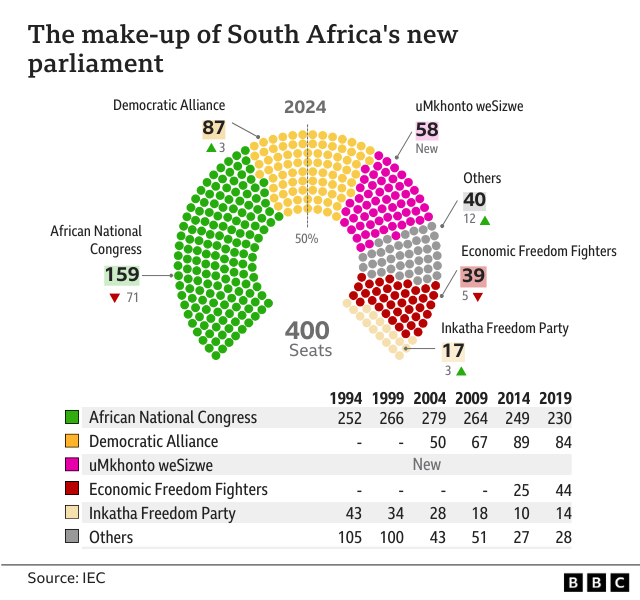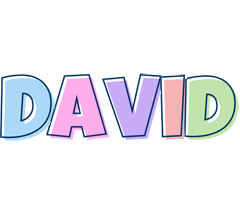South Africa once again has a national unity government, 30 years after a similar deal helped stabilise the transition to full democracy from a nation divided by the racist system of apartheid.
This time the ruling African National Congress (ANC) was forced to negotiate an agreement after losing its controlling majority in elections.
It marks a landmark moment for the country, with the confirmation that the ANC’s new partners include the white-led Democratic Alliance – a pairing once considered unimaginable by many in South Africa.
The main opposition DA party grew out of a union of groups which included what was left of the apartheid-era ruling National Party, and is an advocate of free-market economics at odds with the ANC’s left-wing traditions.
It is still possible that ANC breakaway parties that have not joined the unity government could try to influence events from the outside but the agreement gave shape to South Africa’s political future as its new parliament gathered on Friday for the first time since last month’s historic elections.
“Today, the 14th of June 2024 will go down in the annals of history as the start of a new chapter for our beloved country,” said DA leader John Steenhuisen in a statement delivered in Cape Town, where parliament was meeting.
More detail, including the breakdown of cabinet posts, is expected to emerge in the coming days. But this is not a national unity alliance like the one negotiated by Nelson Mandela in 1994.
At that time the ANC reached across the divide from a position of strength. Now it is doing so from a position of political necessity.
The composition is similar. Thirty years ago the ANC joined forces with the National Party that ruled during apartheid, and the Zulu nationalist Inkhata Freedom Party (IFP).
The IFP has already confirmed it is on board again, alongside the smaller Patriotic Alliance, meaning Cyril Ramaphosa will enjoy another term as president.
But “this is not a government of national unity”, says TK Pooe from the Wits University School of Governance in Johannesburg.
“It’s just a bit of camouflaging so that people don’t have to own that it’s a grand coalition.”
That is because it does not include the parties which came third and fourth in the election – the uMkhonto weSizwe (MK) party of former President Jacob Zuma and the radical Economic Freedom Fighters (EFF) which is popular with urban black youth.
Few doubt that negotiations since the 29 May elections have been difficult.
Many in South Africa are now asking themselves one simple question – will it work?
Fikilie Mbalula, the ANC’s secretary general, has stressed “gravitating to the centre” was the best response to a message from voters, who wanted parties to work together to bring stability to South Africa.
But the political disagreements between the new coalition’s two main parties are sometimes stark.
Perhaps the biggest and most contentious issues are DA opposition to the ANC’s national healthcare policy, and its black economic empowerment programme.

The DA charges the affirmative action measures are inefficient, do not reward meritocracy and enrich ANC cronies.
Derek Hanekom, who was an ANC member of South Africa’s original national unity government, believes the differences are sometimes overemphasised.
“If they say that they really don’t like the legislation,” he told the BBC, “that doesn’t mean they don’t recognise the need for some kind of affirmative action, for some kind of redress – they do.”
“The parties are ready to make compromises and be flexible and at the end of the try to achieve consensus in decision-making.”
However difficult compromise may prove, the announcement of a coalition will bring a sense of relief to many investors and those in the private sector, who might hope for a period of stability.
They had been concerned by the radical left-wing policies of the ANC’s more natural allies, the EFF and MK.
Both of them advocate the nationalisation of land and property – with the aim of redistributing wealth to correct the racialised inequalities that remain embedded despite the ANC’s initial success at lifting millions of black people out of poverty.
The EFF rejected the idea of a national unity government that included the DA, and the MK rejects the constitution, so it did not meet the criteria for joining. Not to mention the personal animosity between Mr Zuma and the man who ousted him as president, Mr Ramaphosa.
EFF leader Julius Malema said the party planned to remain on the opposition benches, and would request key roles in oversight committees.
It’s possible either or both parties might make efforts to disrupt proceedings in the weeks and months ahead.
MK has made claims of election fraud despite failing to produce evidence, trying to block Friday’s parliamentary sitting through a legal effort thrown out by the Constitutional Court.
For ANC supporters, another question is whether the party of liberation is forced to soften its ideology to align with its new partners.
Addressing journalists on Thursday evening, Mr Mbalula repeatedly stressed that a coalition didn’t mean the ANC had changed. “No party is going to die,” he said, “the ANC is not going anywhere.”
But some believe sharing power poses a threat for the party – and could embolden its opponents outside the deal.
“If this grand coalition doesn’t work and dissatisfaction grows, it will only feed into the EFF and MK,” said Dr Pooe from Wits University. “But maybe the key question is whether we see a new ANC.”
Mr Hanekom agrees that South Africa’s seventh parliament could be crucial for his party. “It all depends on what happens in the next few years,” he says.
“This could be the party that people have been waiting for, the kind of leadership that people have been waiting for.
Despite his optimism, for the ANC veteran the stakes are high. “This is a second chance,” he says, “and we dare not fail. Otherwise it will be the end of the ANC. And for the sake our country, it dare not fail.”
“This could either be a reset or a slow path towards South Africa becoming a sad story,” Dr Pooe told the BBC.
“Their performance will show what it is. If it’s a good performance, it’s a good reset. If it doesn’t really do anything – it’s just us bumbling towards being a firmly established, struggling developing country.”






Go to BBCAfrica.com for more news from the African continent.
Follow us on Twitter @BBCAfrica, on Facebook at BBC Africa or on Instagram at bbcafrica
BBC Africa podcasts

David Turner is a globe-trotting journalist who brings a global perspective to our readers. With a commitment to shedding light on international events, he explores complex geopolitical issues, offering a nuanced view of the world’s most pressing challenges.







